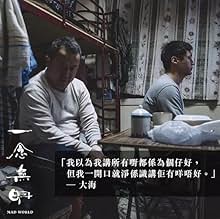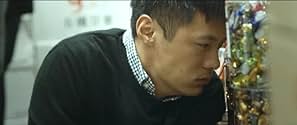Yat nim mou ming
- 2016
- 1 h 41 min
AVALIAÇÃO DA IMDb
7,2/10
2,1 mil
SUA AVALIAÇÃO
Um corretor de bolsa mentalmente doente luta para se reconciliar com seu pai e sua ex-noiva perturbada.Um corretor de bolsa mentalmente doente luta para se reconciliar com seu pai e sua ex-noiva perturbada.Um corretor de bolsa mentalmente doente luta para se reconciliar com seu pai e sua ex-noiva perturbada.
- Direção
- Roteirista
- Artistas
- Prêmios
- 23 vitórias e 31 indicações no total
Bryant Mak
- Louis
- (as Bryant Ji-Lok Mak)
Velu Peter Gana
- Nic
- (as Peter Chan)
Lok-San Mak
- Old Man
- (as Lok Sun Mak)
Ga Man Yeung
- Support Group Parent
- (as Ka Man Yeung)
Avaliações em destaque
Wonderful Honcongo, who would represent the country at the Oscar if selected, introspective, intense, melancholy, sad, it hurts to see the father trying to save his son (although I'm sure he was the one most responsible for the youngest having abandoned them, and having overloaded the firstborn, parental abandonment, this causes deep degradations in the personality in the long run) Tung's pain, trying to get out of the emotional abyss, prejudice, hope in children, beautiful, sad and passionate...
'Mad World' is not an easy film to watch, but it is well worth the discomfiting experience. Not quite enough attention has been paid to the plight of mental health patients who try to re-integrate into the community, and certainly too little attention has been placed on the frustration and even exasperation of their caregivers. While the former often find their best attempts thwarted by the fears, biases and outright discrimination of general society, the latter has to contend not only with the same but also the outbursts of their loved ones struggling to overcome their condition, so much so that many often end up in burnout.
Both perspectives are vividly portrayed in director Paul Chun's feature debut, which follows Tung's (Shawn Yue) acclimatisation to the outside world after spending a year in a mental hospital for bipolar disorder. Seeing little more that institutionalisation can do for Tung, the hospital contacts his estranged father Wong (Eric Tsang) to look after him, but the latter is frankly completely ill- prepared. A cross- border truck driver who was often absent from home, Wong had pretty much abandoned his mentally disturbed wife (Elaine Jin) and Tung years ago, which Tung inevitably still begrudges him for; after all, that had led to Tung needing to quit his job to take care of her when she became bedridden, and that stress of being the only caregiver, aggravated by her verbally abusive ways, had ultimately led to her accidental death one day and his subsequent admission into psychiatric care.
There is plenty in the past that Tung needs to come to terms with on his own, and equally just as much in the present. His friends had deserted him ever since the much-publicised incident a year earlier, and his surprise appearance at a former colleague's wedding soon after his discharge shows how ignorant and bigoted they can be. He wants to make things right with his former fiancée Jenny (Charmaine Fong), who had to repay not just the flat they had bought together but also the moneylenders Tung owed because of a huge loan he took out to finance some risky investments that eventually went south. It doesn't help that social media has fuelled a gallery of judgmental jury, who seize on his unfortunately public meltdown after hearing Jenny's emotive confession of her ordeal to question his mental state and weigh if he should be sent back to hospital after all.
Oh yes, the title could refer to Tung's own mind as much as it could of the external environment he has to navigate – and Wong takes swipes at everything from our prejudice against the mentally ill, to the terrible living conditions of Hong Kong's lower-class, and even to the spate of 'banker' suicides in the financial district back in 2014/15. It is to his credit as well as that of screenwriter Florence Chan that their movie never feels the need to scream at or, for the lack of a better word, get mad at these social ills; rather, both display remarkable restraint at simply keeping it authentic, letting their audience make their own discernments rather than lay out the critique for us.
In fact, 'Mad World' is much better off by simply remaining at its heart a frank and intimate portrait of Tung's struggle to get back on his feet, anchored by the initially tense but ultimately tender father-son relationship between Tung and Wong. Like we said at the beginning, the struggle is as much Tung's as it is Wong's. Through the course of the movie, Wong has to seriously evaluate if he has the means and wherewithal to care for Tung, especially given how little support he has from his family (his eldest son, or Tung's older brother, has resettled in the United States, staying conspicuously absent and callously disengaged throughout), friends and fellow tenants – and let's just say it says a lot when another caregiver at a carer support programme Wong enrols himself in advises him to consider re-admitting Tung back into hospital under the false pretence that the latter is suicidal.
Though more commonly known for his comedic roles, Eric Tsang is in top form here as Wong. In perfectly low-key fashion, Tsang lays bare his character's uncertainties and anxieties at the beginning when asked to look after Tung, subsequent guilt and pain when forced to confront the sins of his past, and eventually resolve to not 'outsource' his responsibilities as a father. Tsang doesn't overplay or overstate Wong's dilemmas, allowing his audience to make sense of his character on their own terms. For that matter, so does Yue, who eschews histrionics in his portrayal of Tung's manic/ depressive state. Proving his mettle as one of the most underrated actors of his generation, Yue gives a layered, nuanced performance that earns empathy without ever playing the 'pity' card.
Aside from the fact that Tung's journey to reintegrate back into the community is not an easy one, 'Mad World' is also not an easy fact simply because there are no easy solutions to the issues faced by people like Tung. At the individual level, it isn't easy for the caregiver, as Wong's own experience here shows. At the community level, it isn't easy for neighbours, friends and even relatives to put aside their fears or biases. And at the societal level, it isn't easy to change mindsets borne out of ignorance or worse convenience. But like the quote which bookends the movie, it starts with having a heart for these individuals we often shun, so that however idealistic it may sound, the world may be a little less crazy for them and for us.
Both perspectives are vividly portrayed in director Paul Chun's feature debut, which follows Tung's (Shawn Yue) acclimatisation to the outside world after spending a year in a mental hospital for bipolar disorder. Seeing little more that institutionalisation can do for Tung, the hospital contacts his estranged father Wong (Eric Tsang) to look after him, but the latter is frankly completely ill- prepared. A cross- border truck driver who was often absent from home, Wong had pretty much abandoned his mentally disturbed wife (Elaine Jin) and Tung years ago, which Tung inevitably still begrudges him for; after all, that had led to Tung needing to quit his job to take care of her when she became bedridden, and that stress of being the only caregiver, aggravated by her verbally abusive ways, had ultimately led to her accidental death one day and his subsequent admission into psychiatric care.
There is plenty in the past that Tung needs to come to terms with on his own, and equally just as much in the present. His friends had deserted him ever since the much-publicised incident a year earlier, and his surprise appearance at a former colleague's wedding soon after his discharge shows how ignorant and bigoted they can be. He wants to make things right with his former fiancée Jenny (Charmaine Fong), who had to repay not just the flat they had bought together but also the moneylenders Tung owed because of a huge loan he took out to finance some risky investments that eventually went south. It doesn't help that social media has fuelled a gallery of judgmental jury, who seize on his unfortunately public meltdown after hearing Jenny's emotive confession of her ordeal to question his mental state and weigh if he should be sent back to hospital after all.
Oh yes, the title could refer to Tung's own mind as much as it could of the external environment he has to navigate – and Wong takes swipes at everything from our prejudice against the mentally ill, to the terrible living conditions of Hong Kong's lower-class, and even to the spate of 'banker' suicides in the financial district back in 2014/15. It is to his credit as well as that of screenwriter Florence Chan that their movie never feels the need to scream at or, for the lack of a better word, get mad at these social ills; rather, both display remarkable restraint at simply keeping it authentic, letting their audience make their own discernments rather than lay out the critique for us.
In fact, 'Mad World' is much better off by simply remaining at its heart a frank and intimate portrait of Tung's struggle to get back on his feet, anchored by the initially tense but ultimately tender father-son relationship between Tung and Wong. Like we said at the beginning, the struggle is as much Tung's as it is Wong's. Through the course of the movie, Wong has to seriously evaluate if he has the means and wherewithal to care for Tung, especially given how little support he has from his family (his eldest son, or Tung's older brother, has resettled in the United States, staying conspicuously absent and callously disengaged throughout), friends and fellow tenants – and let's just say it says a lot when another caregiver at a carer support programme Wong enrols himself in advises him to consider re-admitting Tung back into hospital under the false pretence that the latter is suicidal.
Though more commonly known for his comedic roles, Eric Tsang is in top form here as Wong. In perfectly low-key fashion, Tsang lays bare his character's uncertainties and anxieties at the beginning when asked to look after Tung, subsequent guilt and pain when forced to confront the sins of his past, and eventually resolve to not 'outsource' his responsibilities as a father. Tsang doesn't overplay or overstate Wong's dilemmas, allowing his audience to make sense of his character on their own terms. For that matter, so does Yue, who eschews histrionics in his portrayal of Tung's manic/ depressive state. Proving his mettle as one of the most underrated actors of his generation, Yue gives a layered, nuanced performance that earns empathy without ever playing the 'pity' card.
Aside from the fact that Tung's journey to reintegrate back into the community is not an easy one, 'Mad World' is also not an easy fact simply because there are no easy solutions to the issues faced by people like Tung. At the individual level, it isn't easy for the caregiver, as Wong's own experience here shows. At the community level, it isn't easy for neighbours, friends and even relatives to put aside their fears or biases. And at the societal level, it isn't easy to change mindsets borne out of ignorance or worse convenience. But like the quote which bookends the movie, it starts with having a heart for these individuals we often shun, so that however idealistic it may sound, the world may be a little less crazy for them and for us.
If movie is the modern art form of literature, then this movie is a very caring literature. Why modern life at times would just drive many normal persons crazy?
Many thanks indeed to the writer, director, casts, production crew to try answering this question, with the bit of wisdom during a few dialogue with a little child. For example, the child said "My mother told me, today world, using our hands to work would not make money anymore (?)..."
Many thanks indeed to the writer, director, casts, production crew to try answering this question, with the bit of wisdom during a few dialogue with a little child. For example, the child said "My mother told me, today world, using our hands to work would not make money anymore (?)..."
It is a mad world ... and for some it is even madder. Some people seem not to be able to catch a break. This movie is about outsiders who have issues to stay sane. And who can blame them? If you are into dramas and like slow paced genuinely story telling with some good acting to boast with too, look no further. While this is not for everyone, those who are into it, will love the reality of it all, the gravitas the movie bathes in.
Again you may feel this isn't something worth watching and that is ok. If you'd rather watch something that is quite far away from reality that is more than fine. Just don't blame this movie for being the opposite. If this isn't your kind of deal, just don't watch it.
Again you may feel this isn't something worth watching and that is ok. If you'd rather watch something that is quite far away from reality that is more than fine. Just don't blame this movie for being the opposite. If this isn't your kind of deal, just don't watch it.
If you have a taste for natural light, crying a lot, and excellently genuine (genuinely excellent) screen writing, this is your movie. Though much of the acclaim I've read by online critics is the realism with which mental illness is treated, it heaps some of the most alienating societal abuses of the mentally ill on one person for full effect, short of failure of the justice sytem. Is that realism? Perhaps not, but it has a powerful political/moral point. The result of this is an almost over sweet tearjerker, but I honestly can not decide whether I am amazed that one movie revealed a seemingly unending store of emotion in me, or whether I am disappointed by Chor Hang Chan's reliance on that catharsis. I would go with the former. Outside of borderline cloying revelations, there are some dark and unforgiving moments, and some genuinely humorous ones, acknowledging that redemption is not the only frame for the issue at hand. The performance by Shawn Yue is well in character, drab and passionate at the right moments. And Chun Wong can definitely be relied upon as a director.
And if you watch it for nothing else, the kid is incredibly adorable.
And if you watch it for nothing else, the kid is incredibly adorable.
Você sabia?
- CuriosidadesShot in Hong Kong in merely two weeks with a tiny $257,000 budget.
Principais escolhas
Faça login para avaliar e ver a lista de recomendações personalizadas
Detalhes
- Data de lançamento
- País de origem
- Central de atendimento oficial
- Idioma
- Também conhecido como
- Mad World
- Locações de filme
- Consulte mais créditos da empresa na IMDbPro
Bilheteria
- Orçamento
- US$ 257.000 (estimativa)
- Faturamento bruto mundial
- US$ 1.322.500
- Tempo de duração
- 1 h 41 min(101 min)
- Cor
- Mixagem de som
- Proporção
- 2.35 : 1
Contribua para esta página
Sugerir uma alteração ou adicionar conteúdo ausente



























